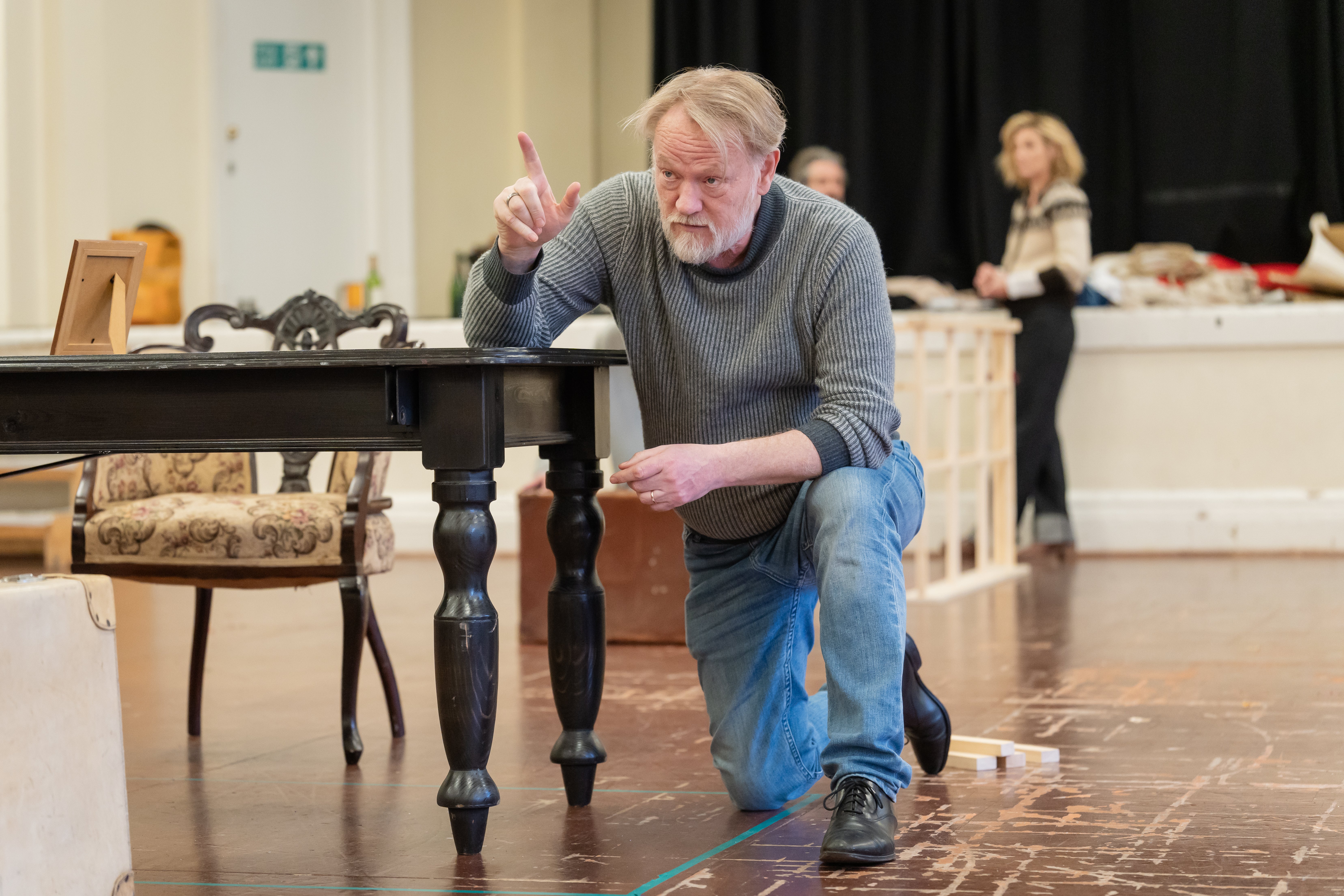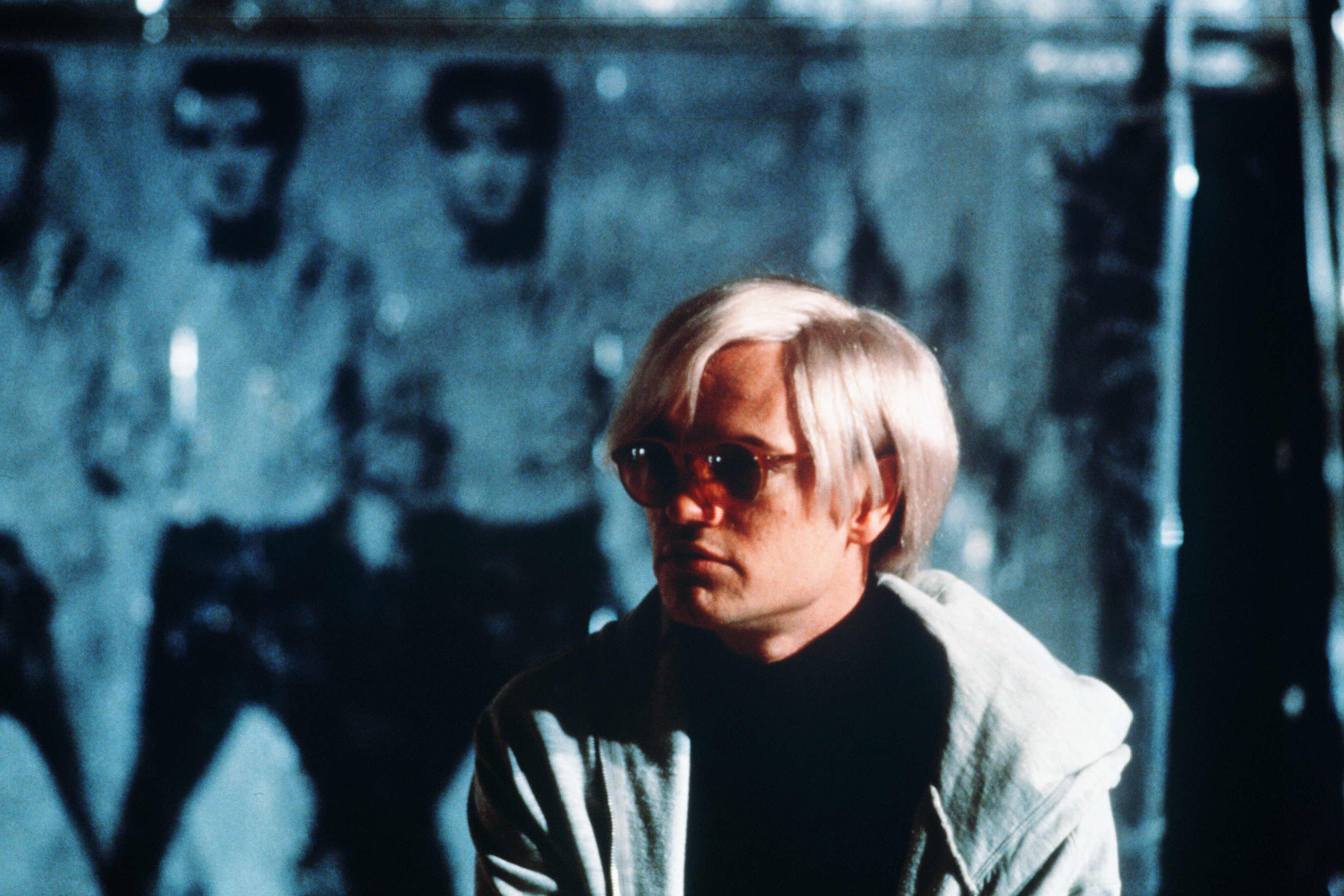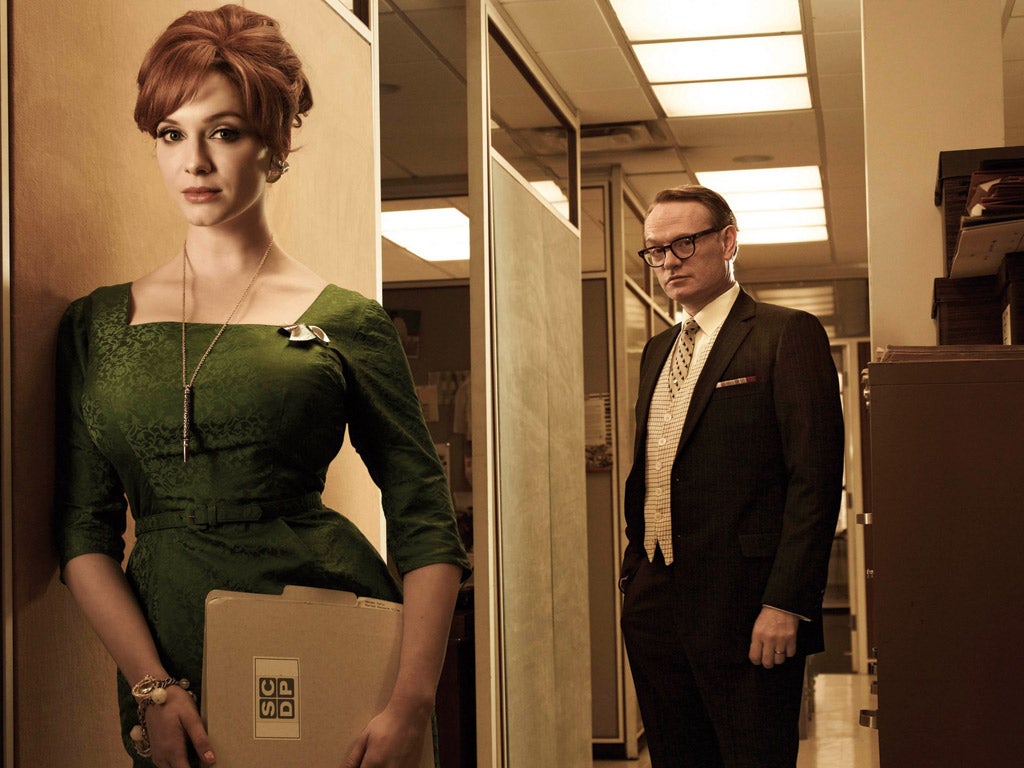
God damn it,” mutters Jared Harris, expelling a large, weary sigh. The face of the actor known for playing Mad Men’s genteel Lane Pryce has just materialised on a video call, and seems, for a brief moment, to be in character. How would Lane Pryce react if he was confronted with sound issues on a Zoom call? I think I’ve just found out. Harris furrows his brow. “This does sometimes happen...” he says, slowly and augustly, “...with Chrome.”
A few minutes of methodical problem-solving later, voila – we have sound. Harris, dressed in a deep red quarter-zip jumper, settles down. We’re speaking over Zoom because Harris is in Stratford, ahead of a new production of Hamlet with the Royal Shakespeare Company. He’s playing Claudius, fratricidal king of Denmark, alongside Nancy Carroll (Gertrude), Luke Thallon (Hamlet) and Nia Towle (Ophelia). Other than this, information is scant; Harris has been told to keep details of the “high-concept” staging nebulous. “Listen, I was trained on Mad Men,” he says, “so you know I’m well able to handle all sorts of attempts to dig information out of me. Do your best.”
There’s something quite bullish about Harris – a thespian swagger that he only occasionally affords his characters. Whether it’s Mad Men’s starchy, ill-fated Lane, Chernobyl’s whistleblowing Soviet scientist Valery Legasov, or Francis Crozier, the saturnine sea-captain of The Terror, Harris has excelled at finding different nuances to play within insular, intelligent men. In other projects, he’s been able to summon entirely different traits – as the angry, bewildered tradesman in Kelly Reichardt’s Certain Women (2016), or as an ailing and contradictory George VI in Netflix’s The Crown.
Harris has been in Hamlet before, too, playing Fortinbras in 1989 alongside Mark Rylance’s lead, and then putting his own spin on the titular Dane at the New Jersey Shakespeare Festival in 2001 (a “40th birthday present” to himself). “There’s a reason why it’s the most produced play of all time,” Harris says, leaning back. “It speaks to a question that all of us ask ourselves: it’s about a character who’s confronting their mortality.”
Does he often think about mortality? The 63-year-old actor cocks his head. “Don’t we all?” He asks how old I am. Twenty-nine, I say. “God, I remember those days,” he replies. “I’m at the age when you start to groan whenever you get up off the floor... you’re aware of the tug of gravity.”
Little seems to get past Harris, who is pleasant and chatty but clearly very shrewd. “I can see you reading notes from the left-hand side of your computer,” he says at one point. (I was – but he’s the first person who’s ever picked up on this.) It’s obvious, too, that Harris is a trained thesp through and through – the sort of person who incorporates Shakespearean turns of phrase into his daily jargon. “Ha!” he says. “My wife [TV host Allegra Riggio] loves Poirot, so every time the word ‘murder’ comes up, I always go,” – he lowers his voice to a growl – “‘Murder most foul, as in the best it is/ But this most foul, strange and unnatural’. Every time. She actually gets really annoyed with me for quoting Hamlet so much.
“When we fly separately, I let her know that I’ve got through security OK by texting her ‘safely stowed’,” he adds – another Hamlet line. When he was at drama school in the 1980s, meanwhile, he and his friends would habitually quote Henry VI, using “Shall we shog?” as a synonym for “Let’s leave”.

Harris, the son of the rambunctious Irish acting legend Richard Harris and Welsh actor Elizabeth Rees-Williams, was a shy youth, raised in strict Catholic boarding schools. After school, he fled the UK for Duke University in North Carolina. “My family had a very specific idea about what my adult life was going to be,” he recalls. “I was to be a lawyer, or something like that. And I didn’t really like what they had in mind. When I went to Duke, I was on my own. There was no family connection around me. Nobody knew me at all. I could figure out who I was and what I wanted to do.” It’s funny just how much he evokes his Mad Men counterpart here – Lane, who is charmed by the freedom and individualism of the US; who remarks with relish that he has “been here 10 months and no one’s ever asked me where I went to school”.
It was at Duke that Harris first tried his hand at directing – Darkmoor was a psychological thriller that he devised with Jeff Bennett, a “genius” of a classmate who taught himself cinematography and was, one summer, “building an aeroplane in his garage”. The film, he says now, “didn’t work – but there were parts of it that were really lovely, and beautiful. And then other parts that were buried up its own arse.
In my heart of hearts, I think that a sort of terrible bargain was made very early on, when I was nurtured on the movies of the 1970s
“We tried to see if we could sell the movie,” Harris explains. “It was just so obviously film-school pretentiousness, full of all the bulls*** of people who spent too much time in film theory classes. I thought, well, if I dub the movie into French, and subtitle it, maybe I can get away with more.” It would ultimately be decades before he took up the directing mantle again, for a seventh-season episode of Mad Men.
While he may have been groomed for law school, it does, in hindsight, seem inevitable that Harris would go into show business: his brothers, Damian (older) and Jamie (younger), are a filmmaker and an actor respectively. Their father was a man of myriad outrageous stories – such as the time he “sucker punched” a man during an altercation in a pub, prompting the man’s girlfriend to run around, hysterically shouting, “Dickie Harris has killed my boyfriend!” (He was fine.) Or the time he disguised himself as a waiter to try to talk up his own casting prospects for Camelot to the producers. (It worked.)
Harris Jr has never gone to quite such extremes to land a role, but has clearly inherited some of his father’s chutzpah. Recalling how he won the part of the eponymous artist in 1996’s I Shot Andy Warhol, he says: “I realised that Warhol would never put himself in that position [an audition]. Ever. He would never be observed, he was always the observer. So I got hold of someone’s video camera, and I walked into the audition saying, ‘Don’t worry about the camera, just ignore it – I’m making a little home movie.’ And I just filmed them all. For those sorts of things, that’s a good way of doing it – and they could always bring me in the day after just to make sure I’m not insane.”

I Shot Andy Warhol may have been Harris’s initial breakthrough, but it’s not like he came out of nowhere. Before this, he had already worked with Michael Mann (in The Last of the Mohicans), Jim Jarmusch (in Dead Man), and Oliver Stone (in Natural Born Killers – though he enjoyed a fractious relationship with the director, who cast, and allegedly hit on, Harris’s then girlfriend). Later, he would go on to work with provocateur Todd Solondz (in the brilliant ensemble piece Happiness), Steven Soderberg (in Ocean’s 12), David Fincher (in The Curious Case of Benjamin Button), John Carpenter (in The Ward), and Steven Spielberg (as Ulysses S Grant in Lincoln) – quite the creative Rolodex, in other words. Increasingly, though, Harris turned to television in search of the sort of meaty, worthwhile parts he deserved.
“In my heart of hearts, I think that a sort of terrible bargain was made very early on, when I was nurtured on the movies of the 1970s,” he says. “There was this period of time when directors were able to make these incredible personal films. And I still foolishly thought that’s what would be available to me when I became an actor. But what’s on offer in feature films has become very reductive and narrow.”
Harris’s pivot towards the small screen coincided with “what people refer to as the Golden Age of Television”, he says. “The film studios had abandoned adult audiences a long time ago, and TV networks – HBO, and AMC, those guys – stepped into the gap. Then you get these incredibly crafted series, like Mad Men and Chernobyl.”

Last year, Harris made another conscious career change – to start doing theatre again, after a break of more than 15 years. His re-entry point was a production of Harold Pinter’s The Homecoming, at London’s Young Vic, at the end of 2023. The Independent described Harris as “compelling” in his role as a “retired butcher and current domestic tyrant [...] who rules his home with a menacing thunk of his walking stick”. The play, though, was divisive: that same review describes Pinter’s text as being “deeply sexist” and “packed with some of the most violently misogynistic jibes against women you’ll find anywhere in the theatre canon”. It was a reaction that the cast were all too attuned to.
“That’s one of the things I really enjoyed with The Homecoming,” Harris says. “It was always a very stark reaction. You had people who would be on their feet, going, ‘Fantastic, amazing’, and others... We shared a corridor with the audience, [separated only by] a curtain, and we would just hear people going, ‘By God, that was vile, I need a shower!’ And both reactions were authentic! Pinter wanted the extremity of that response.”
It’s hard to see the RSC’s Hamlet inciting such vehement objections, at least. “People going to see Shakespeare now,” Harris muses, “they want to see something truthful. You have to handle the language, and the fact that it suddenly becomes poetic, but do that in a way that seems genuine.”
Our conversation starts to wrap up; we exchange goodbyes. “I reserve my right to change my mind about everything,” he smirks. And with that, it’s time to go. That is to say: shall we shog?
‘Hamlet’ is at the Royal Shakespeare Theatre, Stratford-upon-Avon, until 29 March







